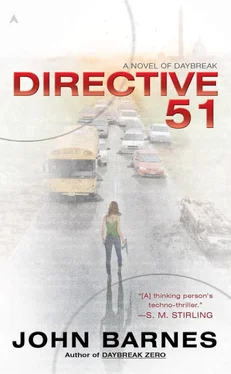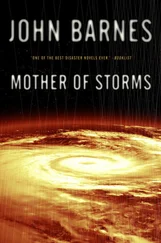ABOUT HALF AN HOUR LATER. YUMA. ARIZONA. ABOUT 3:00 P.M. MST. MONDAY. OCTOBER 28.
Ysabel Roth’s parents had been service-oriented pacifists, raising her in a dozen countries while they bounced all over the world working for justice and development. She’d just kind of naturally gravitated into taking care of the world, doing two years’ service in Mexico right after college. Last year waiting tables at The Green Mother had been less dramatic, but she’d still seen a lot of life.
She yawned, stretched, and rubbed her face. Not nearly as much life as I’m about to see; life never involved a Stinger missile before.
The TV-control thing, linked to the launcher on the roof, showed a big white blimp, which Aaron had said was technically not a blimp but an aerostat. He had nice eyes and such a comforting, technically competent manner that she listened to him explaining tech stuff just to enjoy the sound of his voice. Apparently a blimp had a motor and went somewhere, and an aerostat was just tied to the ground by a long rope. But this aerostat did have a motor, Aaron had made a point of that, and she had nodded and liked the way he pushed his hair back off his face, and the motor put out infrared radiation. It made her sick that people would put radiation into the sky like that, but it would allow the Stinger to home in on it.
It was kind of like a video game, right down to little red letters she couldn’t read because she’d never picked up much Farsi.
Aaron had driven off that morning in a beat-up old Ford Hybridstar, loaded with all her stuff. He’d promised to set it into her room so it was all there when she arrived at the commune in Mexico. To stay here for two days, Ysabel had picked up an air mattress, two cups, a tea ball, and an old teakettle at the Salvation Army, and liberated a few sandwiches and some tea from The Green Mother.
She felt ashamed; Miriam always had been nice to her, even advancing her her first month’s rent for this place.
Well, after Daybreak, things would be better for local businesses, anyway. Meanwhile, Ysabel really needed the tea.
Other than her tea, all she had left was her purse and the cell phone she’d bought at a convenience store three weeks ago, to allow time for them to overwrite the surveillance video.
The kettle whistled; she made her tea; while it steeped, she contemplated the screen. She put the crosshairs on the motor, which turned a generator, which powered a radar thing, which shot radiation into Mexico to keep Mexicans out of the United States.
The idea that someone would keep out peasants, especially with radiation, made her sick. Ysabel loved peasants; she had learned wisdom and truth from peasants everywhere. One supercilious snot-chick at school had said that Ysabel had never met a peasant who wasn’t a great person in wonderful harmony with the whole Earth.
The thing was, it was true . Che had loved peasants, and so had all the great Latin American poets and writers, and for that matter fucking Jesus had loved peasants. Peasants were just, you know, lovable.
Aaron had that Che-Jesus-Latin-American-poet look about him, big wet brown eyes, curly black beard and hair in a mad scraggle, soft sensitive lips and expressive eyebrows…
Ysabel wanted to just talk with Aaron about her love for peasants. She loved faces with real character shaped by troubles, and simple faith in simple stories, and everything about the peasants. She loved their work ethic. She loved their gentle way with children—even when they hit them, it was totally different from some dad in the suburbs mindlessly pouring out rage on a little kid; you could feel the love. She liked the blunt, open sense of humor and the earthiness of the peasant women.
Daybreak was, really, truly, just the beginning of an America with acoustic folk and no country, deep faith and no religion, peasants and no rednecks.
Surely, for that, one little Stinger fired at military property was okay. You had to be practical, ends and means, omelets and eggs, all that stuff she’d had in college.
She smiled. Dad had once told her that instead of playing violent video games, she should be learning something practical.
ABOUT THE SAME TIME. OFF SAN NICOLAS ISLAND. CALIFORNIA. ABOUT 2:00 P.M. PST. MONDAY. OCTOBER 28.
“Forty-eight seconds,” Tracy Barbour said, as the black balloon tumbled upward and away, rising quickly and disappearing into the bright blue afternoon sky. “Beat that.”
“If you’ll take the helm.”
“Just what I was hoping you’d say. And how ’bout a beer for each of us? We’re down to our last two tanks of hydrogen; only about a hundred balloons to go. We won’t be drunk before we finish launching.”
Grady made his way to the cooler, his mind already on the next few months of loafing from port to port while they saw what shape the new world would take.
They always had been very green, from their long vacations spent hiking, to the natural fibers they wore, to the family land they’d put in conservation trusts, and of course their wooden boat, so when Tracy had been IMing with a few interesting people some years ago, they had immediately understood the promise of Daybreak, and a world without industry, because of the stories they had heard as children: Tracy’s grandmother had told her about life in a really big, comfortable house with abundant servants; Grady’s great-grandfather had described, in loving detail, how it was to own the whole estuary of a small river and maintain it for waterfowl and fish.
Rich was always better than poor, of course, but after Daybreak, Tracy liked to say, there would just be more point to being rich. Today’s twenty-first-century squalid, poor industrial world, where even the best of family and school meant only that you could afford a nanny and a cleaning service, a world where there was plenty of stuff but the stuff was all crap, and every damn body that wanted it could go anywhere whether they properly appreciated it or not… faugh !
Daybreak would bring back the world where people had a place, and filled it well, and knew they belonged there.
Grady and Tracy had about half a ton of gold in the concealed second hold, but until there was a safe way and place to spend it, they planned to fish and do small trading; hard work, but climbing mountains and sailing long distances is hard work, so it would be nothing they couldn’t handle.
Grady handed her a beer. “Hard work is overrated.”
“Where did that come from?”
“The cooler.”
“No, silly boy, what you just said.”
“Oh, I was just thinking, the trouble with people who do hard work is that they think it entitles them to whatever they want. Every damn rice farmer in Asia wants to be able to buy all the cheap plastic crap his shack can hold—”
“Do they call them shacks?”
“They call them something in Chinese or some language, hon, it’s just an example.”
“I mean, is it something we’d call a shack or is it more like a hut?” That little smile he had loved madly since St. Albans quirked up the corner of her mouth.
He gulped some icy beer and said, “I did have sort of a point.”
“Okay.” She squirmed to sit up straighter and did her best to look very, very serious.
God, he thought, it’s good to be this in love with my wife after fifteen years. “Oh, just that Asian rice farmer—let’s call him Wong—”
“Fong.” The challenging twinkle in her eye meant You are so getting laid tonight .
“Fong it is. Anyway, Fong’s an example of someone who really overrates hard work. See, because he works like a sonofabitch farming rice, and his kids work hard and long making cheap plastic crap in the factory, he thinks he’s entitled to buy all the cheap plastic crap he can stuff into his shack. He doesn’t get that life is hard work, whether it’s picking rice or climbing Everest or managing a company. Hard work doesn’t have anything to do with it; you should work hard wherever you are and shut the fuck up. You see what I mean?”
Читать дальше












